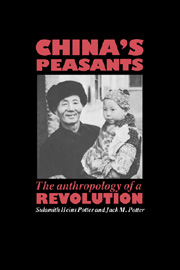Book contents
- Frontmatter
- Contents
- List of illustrations
- List of tables
- Preface
- Notes on the text
- Map 1 China
- 1 The old “feudal” order: Zengbu before Liberation
- 2 Establishing the new order
- 3 The ordeal of collectivization
- 4 The Cultural Revolution
- 5 Maoist society: the production team
- 6 Maoist society: the brigade
- 7 Maoist society: the commune
- 8 Impatient aspirations: transition to the post-Mao period
- 9 The cultural construction of emotion in rural Chinese social life
- 10 Marriage, household, and family form
- 11 Chinese birth planning: a cultural account
- 12 Lineage and collective: structure and praxis
- 13 Party organization
- 14 The party ethic: a devotion born of distress and enthusiasm
- 15 A caste-like system of social stratification: the position of peasants in modern China's social order
- 16 The Chinese peasants and the world capitalist system
- 17 The crystallization of post-Mao society: Zengbu in 1985
- References
- Index
9 - The cultural construction of emotion in rural Chinese social life
Published online by Cambridge University Press: 02 December 2009
- Frontmatter
- Contents
- List of illustrations
- List of tables
- Preface
- Notes on the text
- Map 1 China
- 1 The old “feudal” order: Zengbu before Liberation
- 2 Establishing the new order
- 3 The ordeal of collectivization
- 4 The Cultural Revolution
- 5 Maoist society: the production team
- 6 Maoist society: the brigade
- 7 Maoist society: the commune
- 8 Impatient aspirations: transition to the post-Mao period
- 9 The cultural construction of emotion in rural Chinese social life
- 10 Marriage, household, and family form
- 11 Chinese birth planning: a cultural account
- 12 Lineage and collective: structure and praxis
- 13 Party organization
- 14 The party ethic: a devotion born of distress and enthusiasm
- 15 A caste-like system of social stratification: the position of peasants in modern China's social order
- 16 The Chinese peasants and the world capitalist system
- 17 The crystallization of post-Mao society: Zengbu in 1985
- References
- Index
Summary
The human capacity to experience emotion can be made to serve a wide range of social purposes. Cultural definitions of the appropriate relationship between the emotions of the individual and the social order may vary greatly. The familiar cultural context that provides a frame of reference for anthropologists who are at home in the United States is unusual for its extreme level of emphasis on the importance of emotions as the legitimizing basis that establishes a relationship between a person and a social context. The significance of emotions in Zengbu village life is quite different. The villagers do not assume that the emotional life of individuals is utilized in the service of the social order. As a result, the meaning of the person, and the relationship between the person and society are thought of in different terms. In order to understand these terms without ethnocentrism, some familiar Western assumptions about the meaning of emotion, and the influence of these assumptions on anthropology, must be made explicit.
In the cultural context that is American anthropology's referential framework, it tends to be assumed that the form and meaning of social experience are directly derived from the emotions of a person having the experience; it is not assumed that emotions are a trivial concomitant of experience, of interest only to the person who feels them. Rather, personal emotion is a critical component of experience.
- Type
- Chapter
- Information
- China's PeasantsThe Anthropology of a Revolution, pp. 180 - 195Publisher: Cambridge University PressPrint publication year: 1990
- 1
- Cited by



